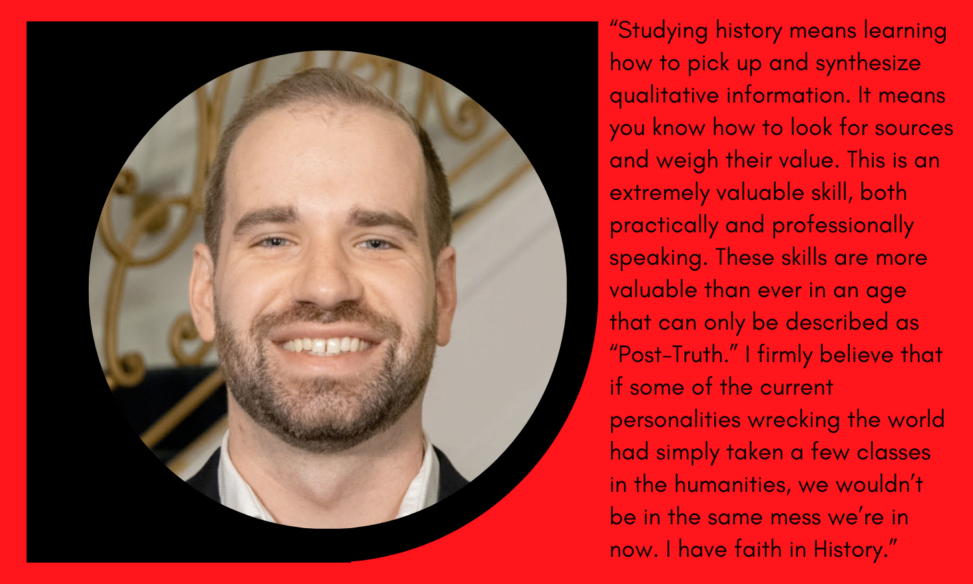I am from Columbus, Ohio, but I have lived all over the place since I graduated from UC with a BA in History in 2012. I lived in Istanbul, Turkey, from 2012 to 2016 and then in London from 2016 to 2017, where I got my MA in History at the University of London, School of Oriental and African Studies. Since returning to the US, I have lived in Washington, DC.
What are you up to these days?
I am an Associate at DAI, INC – one of the largest USAID contractors. My portfolio is dedicated to strengthening cyber security in Ukraine, and I have also worked on a project related to tax reform in Bosnia & Herzegovina. My career involves frequent travel to the regions I work in, so I feel like I am always on the road. It’s an exciting shift in my career away from being a geopolitical analyst – and I am happy to be engaged in work that is far less partisan than some previous jobs I’ve had.
What brought you to history at UC?
By age 15, I knew I wanted to study History at university. The decision to go to UC was made on a simple premise: being from Columbus, I wanted to leave my hometown and live somewhere new. Little did I know what a consequential decision that would be!
What did you focus on as a history student at UC?
I came to UC wanting to study Medieval Eastern European history and focused on that for my first year. During my second year, I started taking classes on the Middle East and North Africa with some truly outstanding professors – Dr. Elizabeth Frierson, Dr. Robert Haug, and Dr. Ethan Katz. This caused me to shift my interest towards the modern Islamic world. I was especially interested in colonialism and flawed Western perceptions of the region. This was in the midst of the failed “war on terror,” so it was quite a revelation to me.
Did you have any favorite history courses? Which ones and why?
It’s so hard to choose! I will pick from the three professors I mentioned above. Dr. Frierson’s “Making of the Modern Middle East” was an incredible dive into the multifaceted ways the Ottoman Empire modernized – with its triumphs and failures. Dr. Haug’s course on Afghanistan demystified a country that was only seen through the lens of the war. It helped me understand how the country was far more complex and, frankly, interesting than the usual dynamic of the Taliban versus the United States. Dr. Katz’s class on French rule in Algeria (and its aftermath) gave me a solid understanding of the meanings and methods of European colonialism, and its sharp focus on culture and literature set a standard for how I analyze history.
What did you focus on in your capstone and why?
This is a good question because I was very disappointed by my capstone experience. My professor told students that we had to focus on a US-related subject, and I struggled to come up with anything that interested me. I ended up writing about the way Cleveland newspapers covered the Hungarian Revolution of 1956 and was unsatisfied with my work. Luckily, my MA that I did in grad school at the University of London, School of Oriental and African Studies was much more interesting, and it focused on the continuation of Armenian culture in Turkey following the Armenian Genocide – and the way that culture fused with Kurdish political and cultural currents.
What skills did you pick up from studying history that have served you well beyond your courses?
Studying history means learning how to pick up and synthesize qualitative information. It means you know how to look for sources and weigh their value. This is an extremely valuable skill, both practically and professionally speaking. These skills are more valuable than ever in an age that can only be described as “Post-Truth.” I firmly believe that if some of the current personalities wrecking the world had simply taken a few classes in the humanities, we wouldn’t be in the same mess we’re in now. I have faith in History.
Have any advice for current students?
Try to get to know your professors on a personal level (if that’s possible). Besides the fact that it will enrich your educational experience, it will also help you forge connections that can be useful for graduate school and your career. Make sure you do an internship or co-op so you can hit the ground running when you graduate. While the idea of being an academic might sound nice, be sure to consider that getting a Ph.D. is by no means a sure path to becoming one. Have a backup plan!
